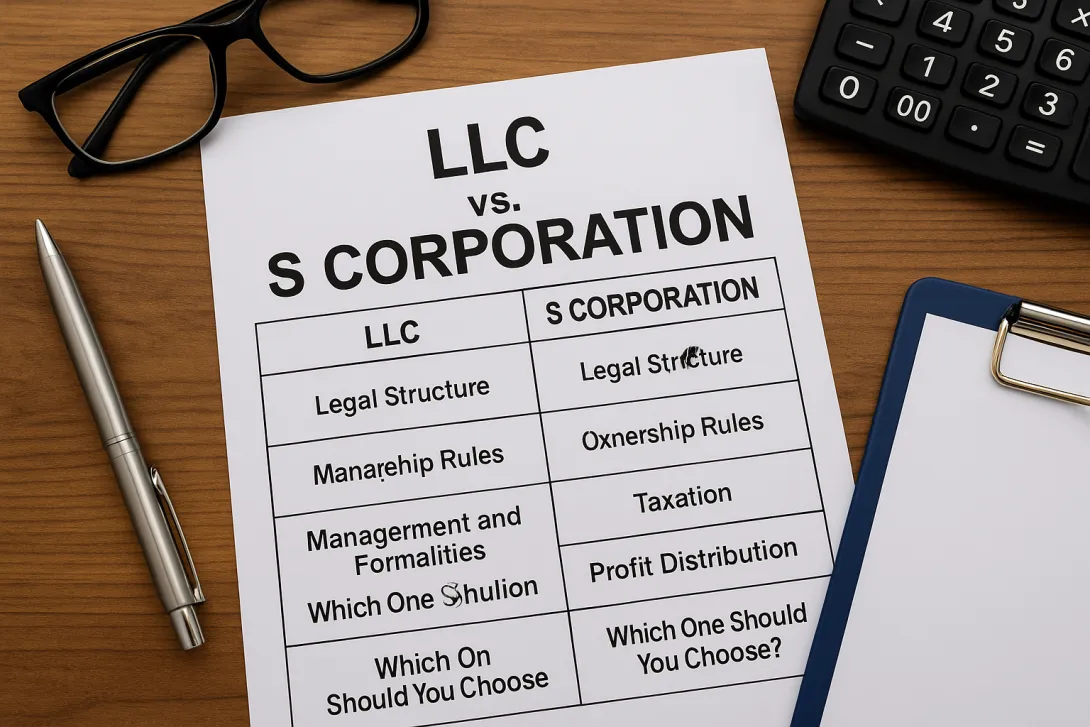
When starting a business in the United States, entrepreneurs often face a critical choice in selecting the right business structure. Two of the most popular options are the Limited Liability Company (LLC) and the S Corporation (S Corp). While both offer liability protection and certain tax benefits, they differ significantly in structure, taxation, and management. Understanding these differences can help you choose the right path for your business.
1. Legal Structure
- LLC (Limited Liability Company)
An LLC is a flexible business structure that blends elements of a corporation and a partnership. It can have one or multiple owners (called "members"), and ownership percentages can be freely determined in the operating agreement. - S Corporation
An S Corp is not actually a type of corporation in itself, but a special tax designation granted by the IRS to qualifying corporations or LLCs. This status allows the business to avoid double taxation while maintaining the corporate structure.
2. Ownership Rules
- LLC:
- No limit on the number of members.
- Owners can be individuals, corporations, or even foreign entities.
- Flexible ownership percentages.
- S Corp:
- Limited to 100 shareholders.
- Shareholders must be U.S. citizens or permanent residents.
- Only one class of stock is allowed.
3. Taxation
- LLC:
- Default: Pass-through taxation (profits are reported on members’ personal tax returns).
- Can choose to be taxed as a sole proprietorship, partnership, C Corp, or S Corp.
- Self-employment taxes apply to all profits for active members.
- S Corp:
- Also uses pass-through taxation, but allows owners to take part of the income as salary and the rest as distributions—potentially reducing self-employment taxes.
- Must file an IRS Form 2553 to elect S Corp status.
4. Management and Formalities
- LLC:
- Less rigid—can be member-managed or manager-managed.
- Fewer ongoing formalities; often requires only an operating agreement and annual reports.
- S Corp:
- Requires a board of directors, officers, annual meetings, and corporate minutes.
- Stricter compliance requirements.
5. Profit Distribution
- LLC:
- Profits can be distributed in any proportion agreed upon in the operating agreement, regardless of ownership percentages.
- S Corp:
- Profits and losses must be distributed strictly according to ownership percentage (shareholding).
6. Which One Should You Choose?
- Choose an LLC if:
You want flexibility in management and profit distribution, minimal paperwork, and fewer restrictions on ownership. - Choose an S Corp if:
You meet the ownership requirements and want potential savings on self-employment taxes, as well as a more formal corporate structure.
Conclusion
Both LLCs and S Corporations offer liability protection and pass-through taxation, but the right choice depends on your goals, tax strategy, and willingness to follow corporate formalities. For some businesses, starting as an LLC and later electing S Corp status offers the best of both worlds. Consulting with a tax advisor or attorney can ensure your choice aligns with your financial and operational plans.
